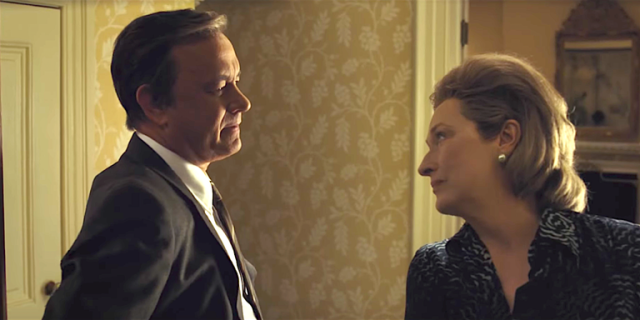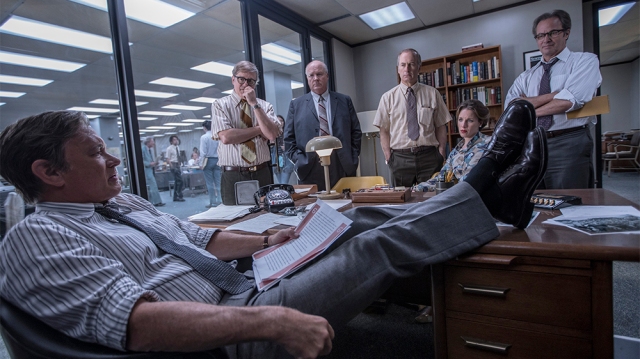The newspaper business. People know about the first word but often forget about the difficulty of the second word. The newspaper does its damndest to deliver the important news of the world to the general public, but it still needs business to pay its hard-working reporters and circulate to newsstands. News needs to sell papers just as much as it needs to be informative, not as a means of capitalism but sustainability. Of course there’s the concern of certain news stories being too shocking or revealing that it might scare people away, especially people with money. Imagine having a story so shocking that it could literally unravel over 30 years of trust and prestige built by the American government, and said government is practically holding a newspaper hostage until every other newspapers promises to betray their duty and not report news. Which word does one protect: the newspaper or the business?
This is the debacle of The Post, a poignant and powerful look at the tug of war between a newsman and a businesswoman. The former is Ben Bradlee (Tom Hanks), editor of The Washington Post who is tired of the Post playing second fiddle to everyone from The New York Times and The Washington Daily News with better stories than his reporters offer. The latter is Katharine “Kay” Graham (Meryl Streep), the publisher of The Post who jumped into job after the paper’s previous publisher, Katharine’s husband Phil, committed suicide in 1963. It’s now 1971 and Kay is about the take the company public on Wall Street to ease financial worries when longtime friend and U.S. Secretary of Defense Robert McNamara (Bruce Greenwood) tells her one night that the Times is going to run an “unflattering” story about him the following morning. The story is the infamous leaking of the Pentagon Papers: 7,000 pages of classified government secrets detailing how the Vietnam War was a lost cause but America would rather send men to their deaths in Army helmets than admit defeat. Bradlee is pissed that the Times got the scoop and wants his reporters to find the pages for follow-up coverage, while Graham is struggling to make her voice heard in boardrooms full of stuffy businessmen determining what’s best for business. Bradlee’s reporters (Bob Odenkirk, Carrie Coon, David Cross) are getting closer to finding the papers and pulling back the curtain of the White House even more, but Graham and Bradlee butt heads over if the Post can handle being on President Nixon’s hit list if they publish more stories.

There are two obvious comparisons to be made with The Post: 1976’s All the President’s Men detailing Bob Woodward and Carl Bernstein’s reporting of the Watergate scandal, and 2015’s Spotlight about the Boston Globe’s crack team of investigators revealing years of sexual abuse by priests of the Catholic Church. Those two movies focused more on the reporting side of journalism, the muckrakers who spent months on end chasing dead-end leads and chipping away at the facts to find what the world needed to know. While The Post does highlight the tireless effort of reporters Ben Bagdikian, Meg Greenfield and Howard Simons, it’s more about the chains that profitability holds on newspapers. Liz Hannah and Josh Singer’s tight script expertly balances the obvious need to report the truth and the equally-obvious fear of the government effectively shutting-down the Post after ordering the Times to stop publishing stories about the papers. Also unlike Spotlight and President’s Men, The Post is a much flashier version of the story courtesy of director Steven Spielberg. While The Post is no blockbuster spectacle, Spielberg’s love of background spotlights and the faded color palette typical of serious Spielberg movies from cinematographer Janusz Kaminski (Schindler’s List, Saving Private Ryan) are ever present. Whereas the filmmaking of President’s Men and Spotlight were more grounded, The Post is a glossy Hollywood production. Fortunately, Spielberg is well-aware of the material he’s working with and leaves most of his eccentricities at the door. The filmmaking doesn’t distract the audience from the story being told and the drama isn’t blown out of proportion, it’s presented for the audience to feel the weight of the story.
Further making The Post an event is the presence of Meryl Streep. Ever since her speech at last year’s Golden Globe awards calling out Donald Trump and announcing her support of protecting journalist, practically all eyes have been on the acting legend and her performance in the movie. Now we can breathe sighs of relief because Streep is in top form here, fully embodying the dual-persona Kay Graham had to take on at the time. In front of the Post’s board members, Graham was patient and unphased by the subtle sexism of her male colleagues. Even if she’s talked over in conversation or talked down to, she keeps a brave face and is able to establish her own presence in every room she walks into. Privately, she’s still a touch unsure of herself as a publisher in the middle of the Pentagon Papers controversy with friends in the Nixon camp (especially McNamara in a heated confrontation). She knows publishing stories about the papers is the right thing to do, but she’s pressured into fearing for how Washington elites might feel about the Post adding to the damage of the Nixon administration, lessening the worth of the paper and her family legacy (her father bought the Post in 1933). Graham is the underdog of the story and Streep plays her without a hint of asking for sympathy.

The rest of the cast basically revolves around Streep, but that doesn’t mean they slack off. Tom Hanks, America’s dad in Hollywood, is a fine choice for the Bostonian grump of Ben Bradlee. It’s actually fitting for smiling everyman Hanks to spend his golden years playing hardened bossmen cracking wise while national history is going on in the background. Even more impressive is the supporting cast: Bruce Greenwood, an expert supporting actor who’s played everyone from John F. Kennedy to a captain of the Starship Enterprise, is incredibly compelling as a man simply stuck in the middle of the worst possible situation a high-ranking government official could be. Despite him actively trying to close the leaking of his own handiwork (McNamara commissioned the Pentagon Papers), he’s not a villain but more of a victim of the incompetence of past presidencies fully-experiencing an unprecedented situation. For the rest of the cast, it seems as if Spielberg has spent the last decade watching every great TV show and picking out who made the best impressions in the smallest amount of screentime, hence solid performances from Bob Odenkirk, David Cross, Carrie Coon, Sarah Paulson, Alison Brie, Bradley Whitford, Jesse Plemons and Zach Woods.
If it weren’t for the political and cultural context, The Post would probably not be as big of an event as it currently stands. It would be a simple reminder that Steven Spielberg remains untouchable as one of the greatest film directors in film history, he knows how to pick his actors and said actors bring their A-game on screen. But now, it is a much-needed reminder of the delicacy newspapers take in informing the American public. There is a crushing pressure to find the sources needed for a story and frivolous work that goes into researching and crafting a story. But even after a story is done and a newspaper is ready to go out, there is still that final moral dilemma of “is this story right,” meaning right in terms of accuracy and right for the readers. In the era of #fakenews, The Post is a reminder how no matter what (or who) the circumstance is, journalists know when to cut the crap and make the country eat its vegetables. It’s meant to show how the effort of listening and taking a stand against lying can be the start of something more, something greater. The best example of this is The Post’s ending scenes: The first being a recorded phone call with President Nixon sounding stressed from the Post’s further investigation of the papers, and the second being a security guard investigating a break-in at the Watergate Complex, the kickstart of the Watergate scandal.
3.5/4
